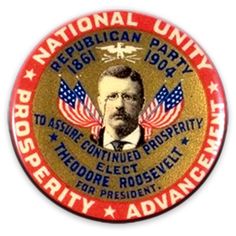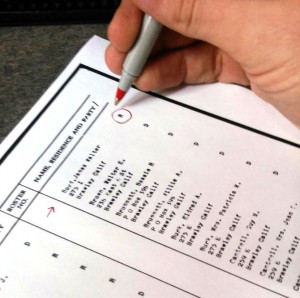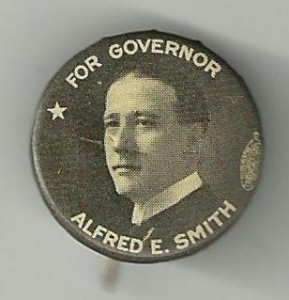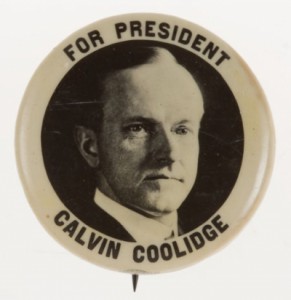 I used to joke that I rarely thought about politics more than twenty-four hours a day. In fact, my pursuit of genealogical research developed alongside my work in opposition and campaign research. Exposed to a variety of Washington, D.C. area archives and repositories, I quickly gathered many records relating to my ancestors from primary sources kept in the same places I consulted in the course of my campaign efforts. Last week, as I researched the nineteenth-century ancestors of our Research Services clients amidst the news of electoral victories and disappointed prospects, I found myself thinking of an interesting source of records that genealogists rarely consult.
I used to joke that I rarely thought about politics more than twenty-four hours a day. In fact, my pursuit of genealogical research developed alongside my work in opposition and campaign research. Exposed to a variety of Washington, D.C. area archives and repositories, I quickly gathered many records relating to my ancestors from primary sources kept in the same places I consulted in the course of my campaign efforts. Last week, as I researched the nineteenth-century ancestors of our Research Services clients amidst the news of electoral victories and disappointed prospects, I found myself thinking of an interesting source of records that genealogists rarely consult.
 If I asked you, Would your ancestor have voted for Lincoln or Douglas, would you know the answer? Historic voter rolls can put flesh on the bones of our ancestors, providing biographical information which gives insight into who they were and what their concerns might have been. We may correlate party affiliation with the partisan concerns of the same period, gleaned from published party platforms (or, less reliably, by checking out Wikipedia’s digest of each major election and presidential administration). In so doing, we gain a sense of who our forebears were and what some of their chief concerns may have been.
If I asked you, Would your ancestor have voted for Lincoln or Douglas, would you know the answer? Historic voter rolls can put flesh on the bones of our ancestors, providing biographical information which gives insight into who they were and what their concerns might have been. We may correlate party affiliation with the partisan concerns of the same period, gleaned from published party platforms (or, less reliably, by checking out Wikipedia’s digest of each major election and presidential administration). In so doing, we gain a sense of who our forebears were and what some of their chief concerns may have been.
 Especially when party enrollment changed over several years, we can intuit that an issue or a political figure inspired the move. In rare cases where personal records of ancestors survive, such as correspondence or videos in our own households or a manuscript in the R. Stanton Avery Special Collections at NEHGS, we can find that our ancestors mentioned events and ideas we can tie to a party shift in the voter rolls. In this way, we can support our characterization of our ancestors’ beliefs and behavior with evidence from primary sources. While we might today imagine that our parents or grandparents were avid supporters of Franklin D. Roosevelt’s New Deal, records showing resolute Republican affiliation should cause us to reconsider our present perspective.
Especially when party enrollment changed over several years, we can intuit that an issue or a political figure inspired the move. In rare cases where personal records of ancestors survive, such as correspondence or videos in our own households or a manuscript in the R. Stanton Avery Special Collections at NEHGS, we can find that our ancestors mentioned events and ideas we can tie to a party shift in the voter rolls. In this way, we can support our characterization of our ancestors’ beliefs and behavior with evidence from primary sources. While we might today imagine that our parents or grandparents were avid supporters of Franklin D. Roosevelt’s New Deal, records showing resolute Republican affiliation should cause us to reconsider our present perspective.
 Will we be surprised to find our ancestors were Republicans when we were raised in a Democratic household? Where can we look for the records that would answer such questions? As it happens, Ancestry and other commercial sites have recently digitized some collections of historic voter registration records (enter “voter” or “electoral” in the keyword section of the card catalog search). Also, some state archives have begun digitization projects, such as Alabama’s digitized 1867 historic voter rolls. Voter registration records are publicly accessible in most U. S. states. Generally, an e-mail to your state’s Office of the Secretary of State requesting information about access will be answered with the hours one can search the records and their protocol for doing so. Local registries are also public records, but access can sometimes be complicated by local officials’ broad application of privacy directives and because these officials often retain the right to restrict use of the collection. However, with patience and the polite assertion that you seek access for a bona fide research purpose, you may be able to trace your family’s political leanings for generations.
Will we be surprised to find our ancestors were Republicans when we were raised in a Democratic household? Where can we look for the records that would answer such questions? As it happens, Ancestry and other commercial sites have recently digitized some collections of historic voter registration records (enter “voter” or “electoral” in the keyword section of the card catalog search). Also, some state archives have begun digitization projects, such as Alabama’s digitized 1867 historic voter rolls. Voter registration records are publicly accessible in most U. S. states. Generally, an e-mail to your state’s Office of the Secretary of State requesting information about access will be answered with the hours one can search the records and their protocol for doing so. Local registries are also public records, but access can sometimes be complicated by local officials’ broad application of privacy directives and because these officials often retain the right to restrict use of the collection. However, with patience and the polite assertion that you seek access for a bona fide research purpose, you may be able to trace your family’s political leanings for generations.
My great grandfather was active in local politics. One great newspaper account told of his wager with a good friend of a differing political persuasion. The outcome was that he got a ride through downtown in a wheelbarrow.
The Humboldt County Historical Society has voter registration information from the late 19th and early 20th century. They include dates naturalized if an immigrant. It is interesting to see that so many went from the naturalization ceremony to register to vote the same or the next day.
My father-in-law was the proud owner of a black top-hat he alway called the “Harrison hat.” He said that it was worn in the presidential campaign. Opponents would attempt to knock off the hats of Harrison supporters with their canes. You have inspired me to do some more research about this campaign and of what family member would have been its original owner.
As a young child, I was aware that my grandfather was a party precinct chairman, but not for which party. Some elections were even held in his garage! This was the 1950s, and he’d been involved in politics at this level for years before this. I assumed, from the fact that my father got excited that Eisenhower’s motorcade went past his workplace and he got a (distant) photograph of the president, that he was a Republican, and since my parents seemed always of one mind, that so was my mother. Only after he died in 2000 did my mother share that when she registered to vote (as a Democrat) she canceled out her father’s vote. My father was also a Democrat. One’s assumptions aren’t always right! My grandfather’s name was Henry Harrison, even though he was born in Norway. When I first began using Google to try to find information on him, it was impossible, as references to Pres. William Henry Harrison swamped anything to my grandfather! So I’m glad to hear about resources for truly finding out about real information when the person’s not around to ask.
In Colonial New England, war / politics was a male issue but women as well gave their voices. In viewing ancestral records of my New England families – both voices have been recorded. And many migrated to the Eastward only to learn that their Loyalists leanings even followed them to all points Down East. Hence the predicament of Martha Moore Ballard and her consort, Ephraim Ballard. While Ephraim made practical peace with the Brown Shirts/ Patriots; a reading of Martha’s dairy indicates that she never fully did. In full disclosure – I am related to both on the Moore and the Ballard sides. Resource- not only Martha’s online diary but the work of Laurel Thatcher Ulrich in her Pulitzer Price winner- “A Midwife’s Tale”.
I expect my Irish lawyer ancestor in Bureau County, IL voted for Douglas. Not because he was in favor of slavery, but because of the nativist and strong temperance leanings of the Republican Party. There are a number of newspaper references to him being a local representative to district and state Democratic meetings in the 1860’s and 1870’s. His obituary published in the Republican paper of the county seat dwells on the point that he had finally converted to temperance in his 80’s
Thank you for Christopher Carter Lee’s article. I found it fascinating. I had no idea that there was a possibility of discovering what one’s ancestors’ political leanings were, though I do remember that when Eleanor Roosevelt (a woman I greatly admired) died at the ripe age of 78, my maternal grandmother said, “A woman that evil had to die.” A compelling indication of her political feelings. Kathleen Van Heuit
What a great article Mr. Lee – such a refreshing perspective on our family trees and indeed on our common heritage. As a member of the extended “New England Lee Family” through my mother’s side I have always felt the pull of both political parties. I appreciate your well spoken thoughts, and the equally well thought out comments that your article has brought from others here – not necessarily including myself! I do wonder how much of our political ideology we inherit in our veins. As a young man in the 1970’s I seemed to embrace the “free” culture of the times, but now as an older person I find myself following in the footsteps of my great grandmother, A Mayflower Descendant who espoused the ideas of a “Red-eyed Republican” as she called herself. In a way, the ideologies, while seeming so different, may have had more similiarities than at first apparent. While I haven’t quite tilted my own scale that far to the extreme right, I do think it interesting that so many of us do eventually end up where our ancestors may have originally placed themselves politically. – @ Kathleen, like you, I had no idea that Eleanor Roosevelt was of such a wicked class – poor gal!
Good stuff Mr. Lee – I think we all hope to hear more from you soon.
Kind regards,
J. Record
I got an indication of my grandparents’ politics ( they both died years before I was born) when my dad told me they would be “rolling in their graves” if the knew who I was voting for back in the Clinton era.
In one large County, a consultant for a large employer used the Socialist Party electoral registration rolls to recommend against hiring registrants and their children. This was well beyond the days of Joe McCarthy, but anti-“leftist” sentiments persisted for decades as well as now.
The name Christopher Carter Lee makes me believe you are a descendent of Robert E. Lee. Is the Carter Lee family part of your family genealogy?
Hi Shirley, yes, I am related to the general, though not descended from him. Thanks for your interest.